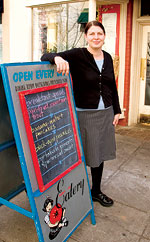
Movin’ on up: Mountain BizWorks Communications Manager Rachel Miller and CEO Greg Walker-Wilson discuss the explosive growth of the formerly named Mountain Microenterprise Fund, which,Walker-Wilson says, is no longer “micro.” photos by Jonathan Welch
|
Walter and Wendy Harrill left stressful careers in medical technology to raise blueberries and raspberries on a farm in Fairview. And what began as a part-time endeavor that brought in a few bucks has blossomed into a successful full-time business. The Harrills now sell their gourmet jams to upscale eateries and grocers, grow shiitake mushrooms and raise rabbits. But Imladris Farms, says Walter, would never have evolved into the operation it is today without Mountain BizWorks.
Until recently, the Asheville-based nonprofit was known as the Mountain Microenterprise Fund. The cumbersome name didn’t exactly roll off the tongue, however; worse yet, it no longer accurately described the group’s work, says Executive Director Greg Walker-Wilson. So the organization officially unveiled its new incarnation, including (hopefully catchier) name and logo, at a Jan. 30 coming-out party in the penthouse of the Battery Park Apartments.
The downtown venue seems an appropriate choice: A number of small businesses the group has helped either start or expand, including the popular Early Girl and Laughing Seed restaurants on Wall Street, lie within easy walking distance.

|
Since 1989, the nonprofit has helped thousands of neophyte entrepreneurs across Western North Carolina access financing, training and technical assistance to help realize their business dreams. Nearly 1,000 of those businesses are operating today—particularly significant in a region where viable jobs are often scarce.
But Mountain BizWorks is no longer a mom-and-pop operation, and neither are a growing number of the businesses it now serves. “This year, I think, we created about 250 jobs and sustained another 350 jobs, and so we realized we’re not micro anymore,” says Walker-Wilson.
“We used to be primarily known for startup businesses,” he adds. “We still see lots of startup businesses, but we also have the experience on staff now to help existing businesses grow, and businesses that might have five or 10 or 15 employees also can get a lot of benefit and work with one of our higher-level consultants and grow their business. So it’s who we work with, as well as the offerings, that have really grown. The [new] name is kind of catching up to who we’ve been becoming the past couple of years.”
Making it work

Taste of success: Manager Kate Leavy outside Early Girl Eatery, an Asheville restaurant that’s prospering thanks to Mountain BizWorks.
|
When Walker-Wilson arrived in 1997 as a grant writer, the group had two staffers and a few volunteers; together, they served about 60 people a year. Today, BizWorks’ 13 full-time and 17 part-time staff administer four different programs, serving more than 600 people a year out of offices in Asheville, Hendersonville and Sylva. Of the 985 current businesses that have used the group’s lending and technical-assistance programs, 609 are female-owned, and 261 have minority owners of either sex. More than half of those businesses are in Buncombe County; the rest are scattered across Madison, Henderson, Polk, Transylvania, Haywood, Jackson, Macon, Swain, Graham, Clay and Cherokee counties.
“We have a whole lot more to offer, and in addition, we’re serving 10 times as many people,” notes Walker-Wilson. “Really, the sky’s the limit. We always have a waiting list for our basic business-planning class. There’s always more people thinking up a new idea or wanting to expand. And there’s still a lot of people who don’t know about us yet, so we’ll be working on the communications.”
As BizWorks has grown, so has its loan limit—from $2,500 18 years ago to $35,000 today. While most clients rely on the organization for its expertise in planning and running businesses, it also has become the region’s safety-net lender for those who can’t get a traditional bank or credit-union loan to launch their business. Typically, these borrowers have been turned down elsewhere either because they didn’t qualify or because the loan amount was too small.
“The only other options are the so-called subprime lenders, like a payday lender,” Walker-Wilson explains. “Or, if they have good enough credit, they might secure a credit card. But those are just really dangerous tools to start your business on. You regularly see people coming in with this massive credit-card debt. They start their business on a credit card, they’re not making enough revenue yet, and they’re just getting killed.”
Mountain BizWorks is not a charity—it has stringent loan requirements, just like a bank, though Walker-Wilson says the group tries to be as flexible as possible. One client who was originally denied a loan got one a year later, after working on a strategy to meet the criteria, says Communications Manager Rachel Miller. “So it’s not ‘No, never,’ it’s ‘No, not right now,’” adds Walker-Wilson. Because lending to marginal borrowers is riskier, BizWorks charges slightly higher interest rates than banks do, but Walker-Wilson says his group’s loan-default rate is comparable—about 1.5 percent.
Support for Mountain BizWorks comes from varied sources, including contributions, grants and earned income. The donors range from individuals to organizations such as churches, banks and even other nonprofits. BizWorks also has income from loans and program fees, as well as the proceeds from Mountain Made, the group’s retail establishment in the Grove Arcade, which sells clothing and crafts produced by client businesses.
Living the dream
Even as BizWorks flirts with the big time, its success is still rooted in local folks who have a dream—whether it’s becoming richer, creating something out of nothing, or simply making a living doing something they love.
Imladris Farms is a prime example. Thanks to an intensive (and eye-opening) business-planning course, the Harrills discovered that they were underpricing their product—the most common mistake he sees among novice entrepreneurs, says Walker-Wilson.
“It was tremendous,” says Walter Harrill, taking a break from pruning blueberry bushes. “It’s so easy to say, ‘I got $2 in this [product]; I’ll charge $3.’ One of the steps of the [planning] process is to sit down and itemize, piece by piece, every single cost that goes into that product—including [your time]. We found out we were charging 25 cents less than it cost to make it. Had we not had that, we would have spent the next several years trying to do more and more business in an effort to find out why we weren’t profitable, and it would not have worked. What [Mountain BizWorks] also did was supply us with a network of other micro businesses; that has been a great support system.” And the business acumen the Harrills have gained through their work with the nonprofit over the past eight years has enabled them to grow their business steadily, safely and successfully, he says.
In the farm’s first year, the couple made 300 jars of jam. In 2006, they made and sold 17,000 jars, along with 800 pounds of shiitake mushrooms and nearly 900 pounds of organic rabbit meat. And rather than marketing their goods from a stall at a Fairview tailgate market as they once did, the couple now peddles its upscale products at Greenlife Grocery, three Earth Fare locations (soon to be expanded to all 13 of the chain’s stores) and several local restaurants, including the Early Girl Eatery, Sunny Point Cafe and Richmond Hill Inn.
“We’ve expanded in a lot of ways, both in products and volume of products and the number of markets,” notes Harrill. “We’re not rich, but we certainly get by, and we’re infinitely more content now than what we were as professionals.”





Before you comment
The comments section is here to provide a platform for civil dialogue on the issues we face together as a local community. Xpress is committed to offering this platform for all voices, but when the tone of the discussion gets nasty or strays off topic, we believe many people choose not to participate. Xpress editors are determined to moderate comments to ensure a constructive interchange is maintained. All comments judged not to be in keeping with the spirit of civil discourse will be removed and repeat violators will be banned. See here for our terms of service. Thank you for being part of this effort to promote respectful discussion.